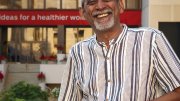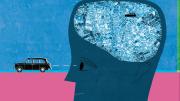As a young man in India, Vikram Patel wanted to be a chef. “I remember very clearly getting into catering school,” says the new chair of the department of global health and social medicine. But a bent for biology, uncovered by an exam, made a career in medicine almost inevitable. A 1987 Rhodes scholarship propelled Patel to Oxford, and on to a doctorate in public health from King’s College. His interest in the brain led him to study neurology, then psychiatry. Neither offered cures for patients, but the latter at least “gave people hope.” When he left England for Zimbabwe at the outset of a career in global health, Patel carried a single suitcase and a single book, now dog-eared: Harvard medical anthropologist Arthur Kleinman’s Patients and Healers in the Context of Culture. Kleinman inspired Patel. Back in the familiar cultural context of India after his stint in Africa, he founded Sangath, a research organization that works with government health systems to support physical and mental health across people’s entire lives, focusing on children, adolescents, and their families. When Harvard offered a professorship in 2007, he reluctantly turned it down. “I was in the midst of one of my most exciting clinical trials,” he explains, testing a psychological treatment for depression that has since transformed the field. Patel now holds a professorship named for the late Paul Farmer, who in 2017 assured him that if he came to Harvard, he would not have to give up his life’s work helping people. Instead, using new technologies, his research has circled back to neurology and the study of child brain development. Nor has he given up his “lifelong joy of working in the kitchen. Chopping an onion may not sound like the most fun thing to do. But I find it very calming.”
Vikram Patel

You might also like
Research on Hold
Funding freeze halts Harvard projects overnight.
Encouraging Harvard to Resist
Alumni and faculty letters urge Harvard to defend itself and academic freedom.
The Dangers of Mirror Life
Life forms built from left-handed DNA and RNA could threaten Earth’s plants, animals, and insects.
Most popular
Explore More From Current Issue
Why Taxi Drivers Don’t Die of Alzheimer’s
Explaining taxi and ambulance drivers’ protection against Alzheimer’s disease.








